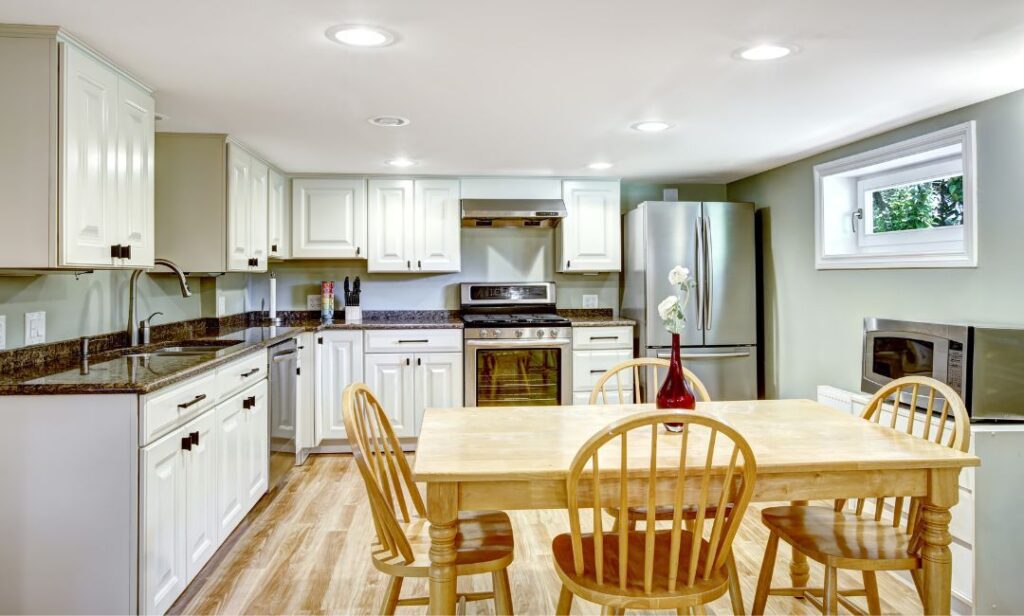Basement Bonanza: How to Turn Your Unused Space into a Profitable Investment
06/17/24

Do you dream of generating additional income, housing family members, or simply creating a comfortable and functional living space? If so, you’re not alone.
With the rising demand for affordable housing and the increasing popularity of multi-generational living, basement apartments have become a sought-after solution for homeowners in High Park, Bloor West Village, Swansea, The Junction, Roncesvalles, and Baby Point.
Whether you’re a seasoned real estate investor or a first-time homeowner, this guide will give you the knowledge and inspiration to turn your basement into a valuable asset!
- Unlock the Potential of Your Basement: Why Converting Makes Sense
- Understanding the Legal Framework for Basement Apartments in Toronto's West End
- Designing a Functional and Comfortable Basement Apartment
- Ensuring a Safe and Accessible Basement Apartment
- Weighing the Options: Renting vs. Housing Family Members
- Unlock the Hidden Potential of Your Home
Unlock the Potential of Your Basement: Why Converting Makes Sense

As a homeowner in Toronto’s west end, you’re likely aware of the increasing demand for affordable housing and the potential to boost your property’s value. Converting your basement into a separate apartment can be a wise decision, offering numerous benefits for homeowners in High Park, Bloor West Village, Swansea, The Junction, Roncesvalles, and Baby Point.
Boost Your Income
Renting out a basement apartment can provide a significant source of additional income, helping to offset your mortgage payments and other expenses. With the current demand for rental properties in the west end, you can expect a steady stream of potential tenants. By renting out your basement, you can earn a substantial income to supplement your household budget.
Increase Your Property Value
A well-designed and fully functional basement apartment can significantly increase your property’s value. This added feature can make your home more attractive to potential buyers if you decide to sell in the future. Even if you’re not planning to sell, a converted basement can enhance your living space and provide a comfortable area for family members or guests.
Convenience for Family and Friends
Converting your basement into a separate apartment can also provide a convenient and cost-effective living arrangement for family members or close friends. This can be especially beneficial for students, young professionals, or seniors who need a comfortable and affordable place to live.
Understanding the Legal Framework for Basement Apartments in Toronto’s West End

Before embarking on your basement conversion project, it’s essential to understand the legal requirements and zoning regulations that govern secondary suites in Toronto. As a homeowner in High Park, Bloor West Village, Swansea, The Junction, Roncesvalles, or Baby Point, you must comply with the City of Toronto’s bylaws and regulations to ensure your basement apartment is legal and safe.
Zoning Bylaws
The City of Toronto’s Zoning Bylaw (2010) permits secondary suites in detached, semi-detached, and townhouse dwellings, provided they meet specific requirements. According to the bylaw, a secondary suite is defined as a “self-contained dwelling unit within a dwelling” (City of Toronto, 2010). You can check the City’s zoning bylaw website to determine if your property is zoned for a secondary suite.
Building Code and Permits
To ensure your basement apartment meets safety standards, you’ll need to obtain the necessary building permits from the City of Toronto. The Ontario Building Code sets out the minimum requirements for building construction, including secondary suites. You can find more information on the Ontario Building Code on the Government of Ontario’s website.
Licensing and Registration
Once your basement apartment is complete, you’ll need to obtain a license from the City of Toronto to operate it as a rental unit. This license ensures that your property meets the City’s standards for safety and maintenance. You can find more information on the licensing process on the City of Toronto’s website.
Additional Requirements
In addition to zoning, building code, and licensing requirements, you may need to comply with other regulations, such as:
- Fire safety standards set by the Ontario Fire Code
- Electrical safety standards set by the Electrical Safety Authority
- Health and safety standards set by Toronto Public Health
It’s crucial to research and understand these regulations to avoid any legal issues or fines. We recommend consulting with a qualified professional, such as a contractor or lawyer, to ensure you comply with all applicable laws and regulations.
Designing a Functional and Comfortable Basement Apartment

When converting your basement into a separate apartment, careful planning and design are crucial to create a functional and comfortable living space. As a homeowner in High Park, Bloor West Village, Swansea, The Junction, Roncesvalles, or Baby Point, you’ll want to maximize the potential of your basement while ensuring it meets the needs of your tenants or family members.
Assessing Your Basement’s Potential
Before starting your renovation, assess your basement’s condition, including:
- Ceiling height and any obstructions
- Natural light and ventilation
- Insulation and moisture levels
- Electrical and plumbing infrastructure
Optimizing the Layout
A well-designed layout is essential for a comfortable and functional basement apartment. Consider the following:
- Create a clear separation between living, sleeping, and kitchen areas
- Incorporate ample storage and closet space
- Ensure a functional and efficient kitchen layout
- Consider installing a separate laundry area
Lighting and Ventilation
Proper lighting and ventilation are critical in a basement apartment. Consider:
- Installing larger windows or skylights to increase natural light
- Using LED lighting to brighten up the space
- Ensuring proper ventilation through the installation of a heat recovery ventilation (HRV) system or a separate HVAC system
Insulation and Moisture Control
Insulation and moisture control are vital to creating a comfortable and healthy living environment. Ensure:
- Proper insulation of walls, floors, and ceilings
- Installation of a waterproofing system to prevent moisture issues
- Use of mold-resistant materials and finishes
Accessibility and Safety Features
Consider incorporating accessibility features, such as:
- Wide doorways and hallways
- Level thresholds
- Grab bars and non-slip flooring in bathrooms
Additionally, ensure your basement apartment meets all safety standards, including:
- A separate entrance and exit
- Working smoke detectors and carbon monoxide detectors
- A fire extinguisher and emergency phone
By carefully planning and designing your basement apartment, you can create a comfortable, functional, and safe living space that meets the needs of your tenants or family members.
Ensuring a Safe and Accessible Basement Apartment

When converting your basement into a separate apartment, safety and accessibility are paramount. As a homeowner, you must ensure your basement apartment meets the necessary safety standards and accessibility features to provide a comfortable and secure living environment for your tenants or family members.
Separate Entrance and Exit
A separate entrance and exit are crucial for a basement apartment. This ensures tenants or family members have a safe and independent means of entering and exiting the apartment. Consider installing a separate door and stairway or a walk-out basement with a separate entrance.
Fire Safety Features
Fire safety is a top priority in any dwelling. Ensure your basement apartment meets the following fire safety standards:
- Working smoke detectors and carbon monoxide detectors
- A fire extinguisher and emergency phone
- A clear escape route in case of an emergency
Accessibility Features
Incorporating accessibility features can make your basement apartment more comfortable and convenient for tenants or family members with mobility issues. Consider:
- Wide doorways and hallways (at least 32 inches wide)
- Level thresholds or ramps
- Grab bars and non-slip flooring in bathrooms
- Roll-in showers or walk-in bathtubs
Emergency Preparedness
Ensure your basement apartment is prepared for emergencies by:
- Installing a first-aid kit
- Providing a list of emergency contact numbers
- Ensuring tenants or family members know the location of shut-off valves for utilities
Regular Inspections and Maintenance
Regular inspections and maintenance are crucial to ensuring the safety and accessibility of your basement apartment. Schedule regular checks to:
- Inspect smoke detectors and carbon monoxide detectors
- Check fire extinguishers and emergency phones
- Inspect electrical and plumbing systems
- Perform routine cleaning and maintenance tasks
By incorporating these safety and accessibility features, you can create a comfortable, secure, and accessible living environment for your tenants or family.
Weighing the Options: Renting vs. Housing Family Members

When considering converting your basement into a separate apartment, you may be torn between renting it out to tenants or housing family members. As a homeowner, it’s essential to weigh the pros and cons of each option carefully.
Renting to Tenants
Renting your basement apartment to tenants can provide a steady source of additional income. This can be particularly beneficial if you’re looking to offset your mortgage payments or supplement your household budget. However, renting to tenants also means you must comply with all applicable landlord-tenant laws and regulations, which can be time-consuming and require significant documentation.
Housing Family Members
On the other hand, housing family members in your basement apartment can provide a convenient and cost-effective living arrangement for loved ones. This can be especially beneficial for students, young professionals, or seniors who need a comfortable and affordable living place. However, housing family members can also blur the lines between personal and professional relationships, potentially leading to conflicts or misunderstandings.
Key Considerations
When deciding between renting to tenants or housing family members, consider the following factors:
- Financial Implications: Renting to tenants can provide a steady income stream, while housing family members may not generate additional revenue.
- Legal and Regulatory Requirements: Renting to tenants requires compliance with landlord-tenant laws and regulations, while housing family members may not be subject to the same legal requirements.
- Personal Relationships: Housing family members can impact your personal relationships and create potential conflicts or misunderstandings.
- Space and Privacy: Renting to tenants may require more formal boundaries and privacy arrangements, while housing family members may allow for more flexibility in terms of shared spaces and amenities.
Ultimately, the decision to rent to tenants or house family members depends on your individual circumstances, financial goals, and personal preferences. It’s essential to weigh the pros and cons carefully and consider seeking professional advice before deciding.
Unlock the Hidden Potential of Your Home
Converting your basement into a separate apartment can be a wise decision, with many benefits for homeowners in Toronto’s west end.
If you’re considering renting out your basement or looking for investment properties in High Park, Bloor West Village, Swansea, The Junction, Roncesvalles, or Baby Point, The Smith Proulx Team is here to help. Our experienced real estate team can guide you through the process, from assessing your basement’s potential to finding the perfect tenants.
Unlock the Hidden Potential of Your Home
Don't miss out on this opportunity to unlock the hidden potential of your home. Contact The Smith Proulx Team today to discuss your options and take the first step towards turning your basement into a valuable asset.



